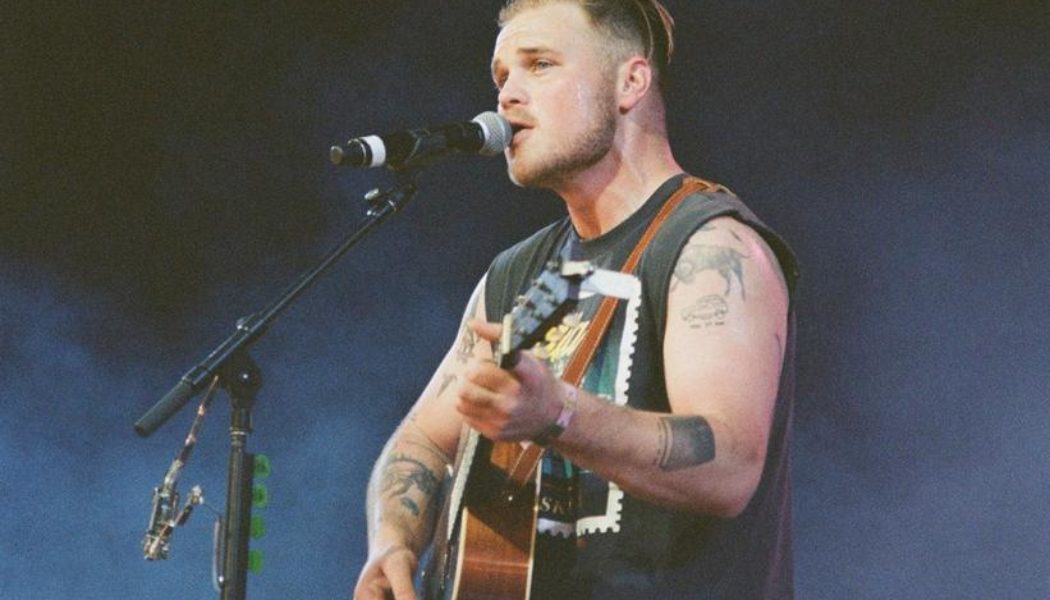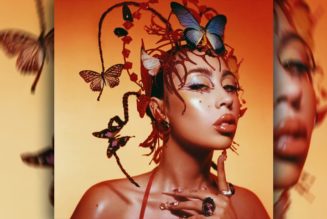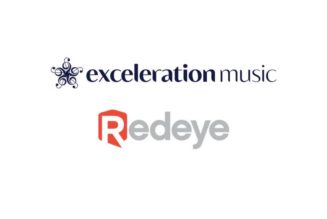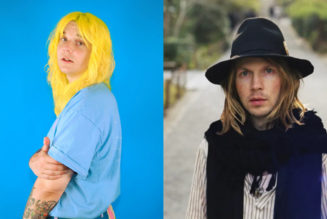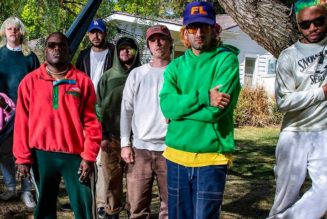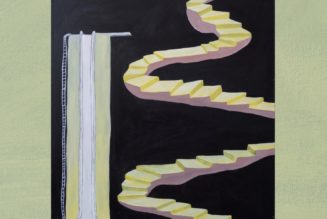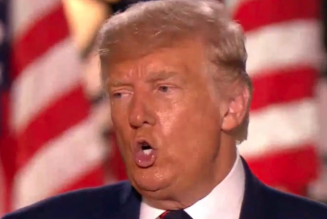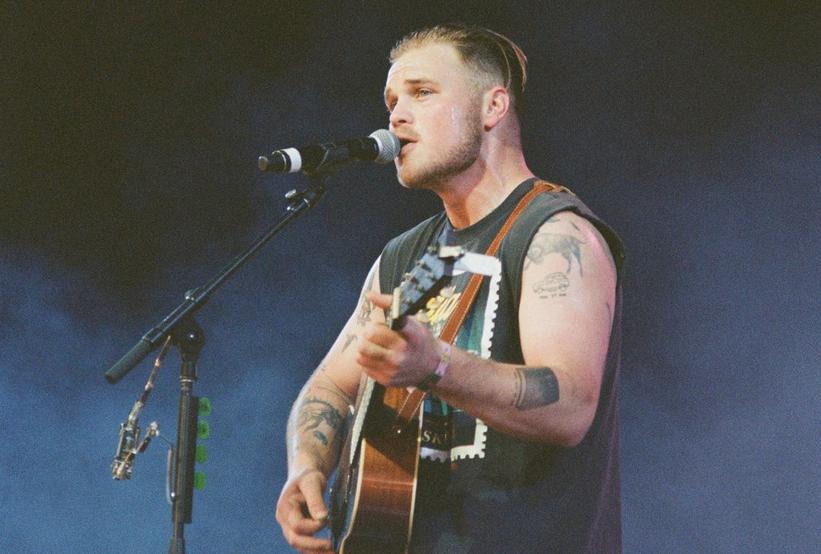
Some say Raymond Antrobus isn’t being deaf correctly. “There are people who feel like I shouldn’t be doing this in a view, talking,” he tells GRAMMY.com over Zoom. “That I should be signing, and I should get an interpreter.”
Instead, the poet uses use technology that dramatically improves his quality of life. Among other things, his phone acts as an external mic, which boosts the clarity of the input.
“If technology has enabled me to have a direct conversation, then am I just performing something?” he asks. “Is that not authentic?”
Antrobus is far more concerned with the authenticity of his artistic output. Mixed in an accessible way for hard-of-hearing listeners, his new album, An Investigator (of Missing Sounds), is an unvarnished portrait of his experience.
“There is a kind of authenticity within it, which is to say that there are also shortcomings, there are also contradictions. It’s not trying to be perfect or say something perfect,” Antrobus says.
Poems like “The Perseverance,” “The Acceptance” and “Every Sound in the World” are charged with Antrobus’s ethos — to “honor my authentic self, and what deafness is to me, what language is to me, and my day-to-day experiences.
“Because I’m in my head quite a lot,” he continues. “I’m trying to convey what this internal headspace is like, and get it out and share that and hope that people resonate or understand what I’m speaking about.”
Read on for an interview with Antrobus about the road to An Investigator (of Missing Sounds), navigating his deafness and his personal conception of his artform.
This interview has been edited for clarity.
What did you want to artistically impart with An Investigator (of Missing Sounds)?
Almost like an experiment, if I’m honest. There was no real grand vision.
I’ve been performing and writing poetry since I was a kid. And every now and then, I meet someone who’s interested in recording my poems and my words.
Collaborating with [producer] Ian Brennan with his experience, and his understanding and appreciation of the voice as an instrument, felt like a worthwhile, important, potentially powerful collaboration or connection to make.
I think I wanted to create something that was kind of unexpected. The idea of the investigation of missing sound is to find a way into silences, to find a way into places where there’s perhaps not much language — or no language, no noise, silence — and try and voice it.
I know that sounds quite vague and out there, but that’s how almost in the dark I was in this collaboration and bringing it together.
Tell me more about how it came to be.
We recorded about three times that amount of material; it was Ian who kind of constructed the order, the atmosphere.
One way I think of Ian is as a kind of scientist of sound. He’s done things with the track or the sound, which I don’t access. I have to let other people listen to it to tell me what else is happening — my own missing sound, because there’s things in there that I’m missing.
This is our second collaboration album; that was the case with the first one as well. So I don’t hear any high decibel sounds. So if there’s anything that’s kind of faint, or an alarm, or a ringing, or anything high pitch, is just not going to… I just don’t pick that up.
Ultimately, there were so many poets who record their poems and make poetry albums who I love. Poets like Jerome Ellis and some dub poets from the ’80s and the ’70s, like Linton Kwesi Johnson and Jean “Binta” Breeze and Mutabaruka.
So, I’m very much inspired by quite a lot of British, or European and Caribbean poets and noise makers, in a way. I’ve always wanted to make projects or records where the most important thing is the voice and the words. And that has been difficult to find someone that aligned with that vision.
I was in a band once and they just wanted me to rap. And I was like, “No, no, no. I’m a poet. I can’t. Just don’t let me rap.” So that was a frustrating, a kind of creatively frustrating experience that I’ve had.
Whereas in An Investigator (of Missing Sounds) with Ian, he was just free. He was like, just record the poems, just let the voice and the words just do what they do instinctively.
Being trusted as a poet — and as a vocalist as well — is a new and liberating terrain for me.
Tell me how you’ve navigated your deafness up to this point.
I was educated in deaf school in London. I was slow to read, and I was slow to write.
So much of my engagement with language and with the written word has always felt very charged because I had to do so much work with speech therapists, with teachers of the deaf, with English teachers. Luckily, I got a lot of support when I was a child, because my deafness was picked up late.
I feel like with almost every poem I write, or every poem I record, or every poem that I want to get heard, it feels like I’m trying to honor the teachers or the people that have given me this speech or this language — and I don’t want to waste it.
That’s why it feels like so much is at stake for me. This is not something I can take for granted. Having a voice, wanting to be heard and channeling that through poetry felt and feels appropriate.
I’m sure this life change deeply altered your perspective as a poet.
I think so. It has enriched it, but it’s also complicated it more — because I suppose people think about deafness or deaf identity as a kind of culture, a kind of lifestyle.
There’s this idea sometimes within that community that there’s a certain way to be a deaf person. So if you are speaking rather than signing, and you are someone who has done a lot of work to be able to sound like a hearing person, sometimes there’s a bit of guilt that comes with that because my access is a privilege.
I have also visited deaf schools all over the world, around Africa and the Caribbean, around Europe. One of the most consistent things I see is a lack of funding to deaf schools. Most deaf schools and places that students don’t even have hearing aids, let alone high-tech hearing aids that come with an app.
So it is complicated, but at the same time, it’s also been quite interesting with the new technology, for example, watching films that I’d seen when I was younger and then realizing how much I had made up the plot of those films, or just had a completely different idea of what the films were about or what was going on.
The hearing aids aren’t a cure, they’re still an aid. The problem isn’t always the sound itself. The volume of the sound is still happening, but then sometimes my brain just can’t figure out exactly what it’s saying.
Can you give me an example?
I went to see Oppenheimer the other day. I thought it was a really good film, but I missed quite a bit of it because it was in this IMAX, a very bassy cinema, and the film is very talky film. With a lot of the dialogue, it was almost like reverting to my older days when I was just having to patch things together.
So I had to watch the film and then actually read about Oppenheimer and the experiment in New Mexico, everything like that after I’d watched the film to pick up on what has happened.
But I mentioned that film because I was actually really struck with the sound structure of it. It was an event of sound for me. The idea that light travels faster than sound — how that is a principle throughout the whole film.
I feel like there were a lot of things I noticed in that film in terms of the sound — that maybe hearing people, people that don’t think as much about the physics of sound and the way of being in sound, might have missed.
That’s interesting to me. It is a rich experience, but it still can be an alienating one knowing that most often other people are on a different page from you.
To get back into An Investigator (of Missing Sounds): what made Ian the man for the job? Ian seems to possess an uncommon level of perceptiveness.
He does. So many things came together in our meeting, but basically he’d reached out and said that he was a fan of my work.
I’d written a children’s book; Ian bought it for his daughter, and she really resonated with it as well. And then Ian was releasing a polemic book on the music industry [2016’s How Music ies (or Lives): Field Recording and the Battle for Democracy in the Arts], which is a really good read.
He asked me to come and basically read some poems at the launch. I did that. And at the launch I had a ESL interpreter show up; I was like, Wait, I recognize you. She happened to be one of my support teachers for when I was at school.
So, that was a kind of strange coincidence where we had this whole kind of conversation around the chances of that happening.
At the end of the event, Ian just said, “Look, you have a voice —I just hear something and recognize something that I need to capture.”
Because at this point, I’ve spoken to Ian at the length about the philosophy of sound, about the philosophy of what makes a great vocalist, about the capturing music, and lyrics, and vocals that are outside of the mainstream Amplifying voices and sound that are basically from the margin and trying to center that.
I think Ian and I just kind of had a lot of similar understandings and similar appreciations for those kinds of, I suppose, marginalized narratives. And it just kind of connected, synced together.
It was just like a gut feeling — that this is someone I should work with. This is someone I feel I can trust with my poetry, with my voice to put on a record and hopefully get it heard and have it resonate with others.
Where do you want to go from here? What possibilities are flung open thanks to An Investigator (of Missing Sounds)?
Maybe four years ago, I was teaching creative writing in a men’s prison. Most of the men I was working with, they’re in jail for life and they’re not coming out, and they’ve taken a liking to poetry.
Half of the group were raised in the same part of London that I’m from. And they’d been given copies of my books before I’d gone to work with them.
The ones who were from where I’m from in East London, in Hackney, once they heard me read the poems they said to me, “Look, I liked reading your work, but when I heard you, I understood you. I had to hear you to understand where you’re from and what you’re about.”
I connected with that, and I never forgot that. That, for me, told me to lean more into my voice and to get some recordings out. And I feel like having had that now, it would just open up my work and the world that I’m talking about, this kind of internal world of mine, to hopefully find more worlds to connect with.
I’m still interested in further collaboration. I’m interested in reaching audiences outside of people who might feel like poetry isn’t for them, or that poetry is too, I don’t know, earnest, or too predictable, or too much of an old idea. But I truly believe that if poetry had nothing to offer the world today, that it would’ve died a long time ago.
There’s just no way that this art form, which is one of the most ancient art forms of humanity, which is still very much living, breathing, being practiced, being taken seriously by a lot of people in the world.
So I really do feel like, or hope, one of my hopes is that the album would just reach the ears of people who wouldn’t have opened up a poetry book in a library or bookshop and connected. But when they hear the voice, maybe they connect with that.
Meet Question, A Rapper/Producer Who Doesn’t Want To Be Boxed In By Blindness
